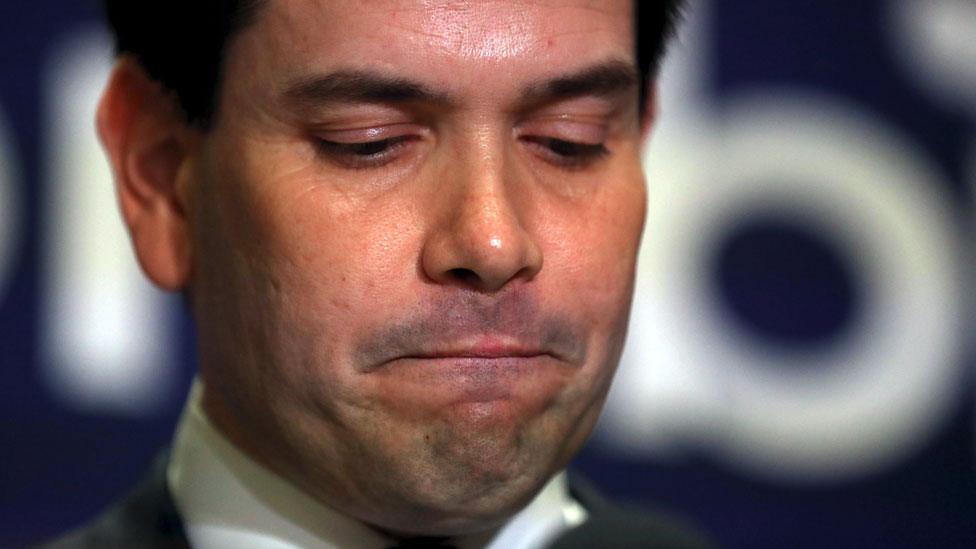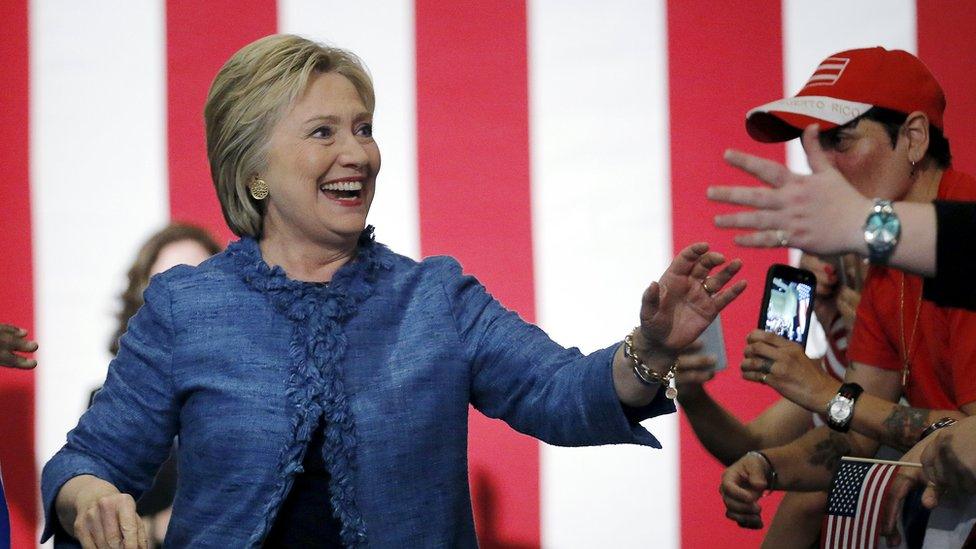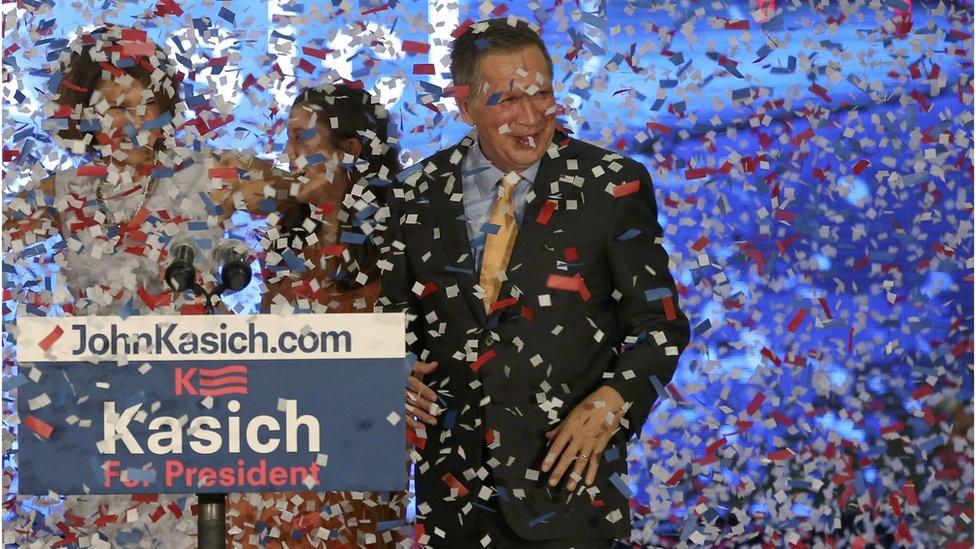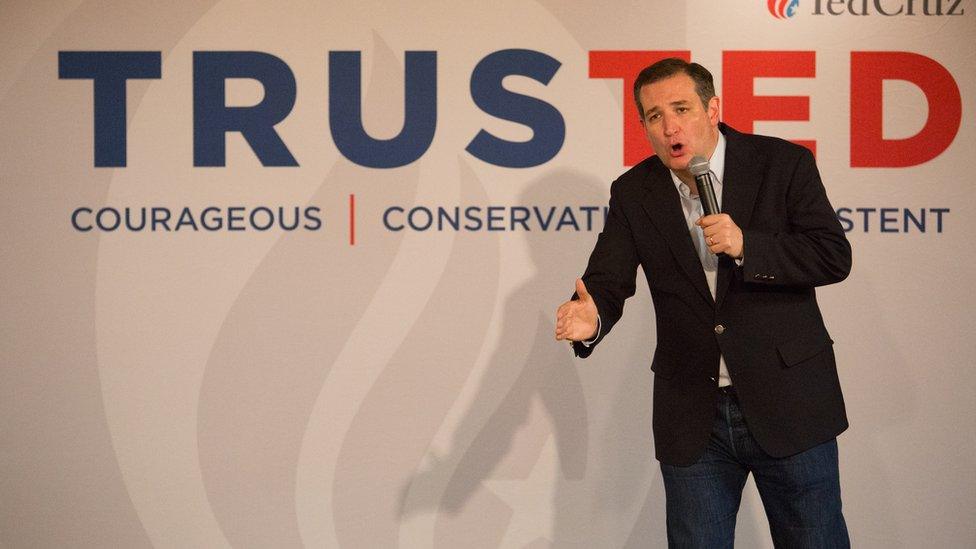US election 2016: Fall of Republican saviour Marco Rubio
- Published

End of the road for Rubio
It was a night when Donald Trump, John Kasich and Hillary Clinton gave victory-style speeches, and Marco Rubio bowed out in defeat.
The Republican field narrowed on so-called Super Tuesday II with the departure of Mr Rubio but it now becomes a three-way fight between Mr Trump, Mr Kasich and Texas Senator Ted Cruz.
Five big states cast votes and Mrs Clinton has won four of them so far, cementing her lead over Vermont Senator Bernie Sanders.
So what did it all mean? BBC reporters give their views on some of the candidates.

Fall of 'saviour' Rubio
Senator Rubio was once portrayed as the saviour of the Republican Party, a Cuban-American supposedly with multiracial appeal, a devastatingly articulate 40-something who could halt what's been called the GOP's demographic death spiral - its failure to attract the support of ever more important Latino voters.
But Mr Rubio was an establishment favourite in an anti-establishment year and ran on a hopeful and optimistic message at a time of resentment and rage. Even his story of immigrant success - he's the son of a bartender and maid, and personifies the American dream - sounded off-key at a time in the conservative movement when anti-immigrant sentiments resonate more strongly.
Despite hoping that his youth would be a prime asset - he claimed to represent the children of the Reagan revolution - he's found it hard to shake off the taunt from Donald Trump that he's "Little Marco", a political bantamweight not ready to be president. And once he tried to demonstrate his toughness by wrestling with Trump in the mud, trading personal insults above the size of hands and the dimensions of other bodily parts, it was all over.
Nick Bryant, BBC North America correspondent, Miami


Clinton said Trump was 'not strong but wrong'
Clinton on path to nomination
Hillary Clinton did better than her team expected in number of votes and delegates. For days, her advisers were managing expectations, aside from Florida where they expected a clear victory.
Even as exit polls showed she was winning in Ohio, her aides were cautious. They wanted no repeat surprise after Mr Sander's upset in Michigan last week. Both Mrs Clinton and Mr Sanders saw Ohio as a key state: he needed to win there to pick up momentum and show he was a viable candidate who could win swing states in a general election.
Instead it was Mrs Clinton who won Ohio and her victory in Florida, another swing state, solidified her grip on the Hispanic vote. All of this will work to the Democrats' advantage come November. Mrs Clinton is now effectively the nominee even if her campaign isn't ready to say so.
They will wait for the moment in a few weeks when it becomes mathematically impossible for Mr Sanders to catch up. Even then it's unclear if the Vermont Senator will drop out. He will try to keep generating excitement among young voters and work to shape the Democratic agenda, hoping to push Mrs Clinton further to the left until the convention. Will his supporters still turn up if it's a futile quest?
Mrs Clinton will be hoping they'll start to flock to her out of fear of what they see unfolding on the Republican side. In her victory speech, Mrs Clinton was clearly declaring the start of the general election, calling Mr Trump by his name for the first time and urging Democrats to rally around for an election she described as consequential not just for the US but for the world.
Kim Ghattas, BBC News, West Palm Beach

Teflon Trump gets sticky
And then there were three. After Senator Marco Rubio's crushing defeat in his home state of Florida at the hands of Donald Trump, he had little option but to end his campaign for the presidency. At the Mar-a-Lago, Donald Trump's sumptuous gilded palace-cum-private members' club in Palm Beach, this was cause for big celebration.
He didn't just win. He won big. And he won in three other states too. But perhaps unusually - even uniquely - for a man who has totally dictated the media narrative since he convulsed the Republican race by entering the fray last June, the focus might just be on the state that he lost, rather than the states he won. For John Kasich's victory means that the battle for the Republican nomination not only goes on, it could go all the way to the convention in July.
And in the Donald J Trump ballroom (what else was it going to be called?) Mr Trump gave a victory speech that sounded anything but victorious. It was low key, understated - and he had the air of a man who was weary of the punishing campaign schedule. Two weeks ago, he seemed much more confident of winning the Republican nomination than he did tonight.
And tellingly, while he was magnanimous in victory by praising Marco Rubio for running a tough campaign and talking about his bright future, Governor John Kasich didn't get a single mention. As if his defeat in Ohio hadn't happened. Maybe it was an oversight - or maybe that the Teflon man has found politics suddenly getting a lot more sticky.
Jon Sopel, BBC North America editor, Palm Beach


Kasich was emotional in his victory speech
Kasich banks on messy convention
John Kasich has not had much to celebrate up until now. Before Ohio, he had won precisely zero primaries and amassed only 63 delegates from more than two dozen contests.
But his team must have been confident enough in the home state advantage since they had hired two enormous confetti cannons to shower jubilant supporters as the victorious governor vowed to fight all the way to the Republican convention in July.
And his focus on the convention - more specifically a contested convention - is understandable, as that's the only hope he has of clinching this nomination. Put simply - he would need to win virtually all the remaining delegates in all the remaining primaries to get anywhere near the 1,237 to capture an outright win, and that is not going to happen.
However, some things will now get easier for him. As the new establishment favourite, he will find more money flowing his way; endorsements might follow from people like Senator Marco Rubio, together with his supporters; and of course, having survived to the last three, people will start to take notice in a way they have not to date.
But it is a long shot. And the confetti cannons might simply have heralded the bridesmaid rather than the bride.
Gary O'Donoghue, BBC Washington correspondent, Berea, Ohio


Cruz wants a one-on-one with Trump
Cruz hopes for two-horse race
"Tonight was a good night," said Ted Cruz as he addressed a crowd of his faithful who'd packed into a hotel ballroom in his home city of Houston, Texas.
His campaign had entered this second Super Tuesday with relatively low expectations - there were no realistic hopes of winning a delegate-rich "winner-takes-all" state like Florida or Ohio - the plan was to pick up delegates where they could, however modest, to add to the tally and solidify their second place to Donald Trump.
But the big prize for Team Cruz was Marco Rubio's exit from the race. On stage Senator Cruz paid tribute to his "friend and colleague who ran an optimistic campaign", at the same time appealing to Mr Rubio's supporters to back him now.
The narrowing of the Republican field will delight the Cruz camp. They have long argued that the Texas Senator is the only candidate who can beat Donald Trump, and that a wider pool of hopefuls is splitting the vote, and the party.
But this isn't yet a two-horse race. The staying power of Mr Kasich could frustrate Mr Cruz's ambitions.
Only one candidate has beaten Donald Trump in this race, exclaimed Senator Cruz as his supporters looked on adoringly, "not once, not twice but nine times".
But he failed to mention how many times Mr Trump has beaten him - and therein lies his problem.
Rajini Vaidyanathan, BBC News, Houston